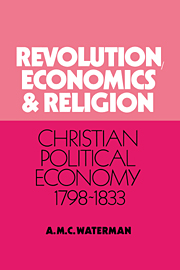Book contents
- Frontmatter
- Contents
- List of figures
- Acknowledgements
- Abbreviations
- 1 POLEMIC, IDEOLOGY AND ‘CHRISTIAN POLITICAL ECONOMY’
- 2 THE FIRST ESSAY ON POPULATION: POLITICAL ECONOMY
- 3 THE FIRST ESSAY ON POPULATION: THEOLOGY
- 4 THE RECONSTRUCTION OF MALTHUSIAN THEODICY: PALEY AND SUMNER
- 5 OXFORD CONTRIBUTIONS: COPLESTON AND WHATELY
- 6 CHALMERS AND THE ESTABLISHMENT
- 7 THE END OF CHRISTIAN POLITICAL ECONOMY
- Appendices: The Malthus–Chalmers model of stationary equilibrium
- Bibliography
- Index
1 - POLEMIC, IDEOLOGY AND ‘CHRISTIAN POLITICAL ECONOMY’
Published online by Cambridge University Press: 27 August 2009
- Frontmatter
- Contents
- List of figures
- Acknowledgements
- Abbreviations
- 1 POLEMIC, IDEOLOGY AND ‘CHRISTIAN POLITICAL ECONOMY’
- 2 THE FIRST ESSAY ON POPULATION: POLITICAL ECONOMY
- 3 THE FIRST ESSAY ON POPULATION: THEOLOGY
- 4 THE RECONSTRUCTION OF MALTHUSIAN THEODICY: PALEY AND SUMNER
- 5 OXFORD CONTRIBUTIONS: COPLESTON AND WHATELY
- 6 CHALMERS AND THE ESTABLISHMENT
- 7 THE END OF CHRISTIAN POLITICAL ECONOMY
- Appendices: The Malthus–Chalmers model of stationary equilibrium
- Bibliography
- Index
Summary
INTELLECTUAL HISTORY AS POLEMIC: AND VICE VERSA
To expect an historian to write with no polemical intent is not unlike expecting a privately owned business to conduct its affairs with a view to the public interest. No doubt it can be done. But to require it is unreasonable and is, moreover, to miss the point of the activity. History is served not so much by the pure intentions of the author as by the criticism of his colleagues.
The original purpose of this book, therefore, was unashamedly polemical. It was to disturb a popular view of modern intellectual history, and to challenge one of its scholarly correlatives. I have by no means lost sight of this object. But its pursuit has generated a number of secondary aims, some of which may interest historians, economists, theologians, political theorists, and others with no desire to grind my particular axe. What this means is that instead of having only one reason for existing, my book now has no fewer than five. For the evidence which supports my primary thesis bears upon two questions much canvassed by historians of eighteenth and early nineteenth-century British politics; and upon two others of importance for some, at least, among my fellow economists. Each of the five must be explained.
- Type
- Chapter
- Information
- Revolution, Economics and ReligionChristian Political Economy, 1798–1833, pp. 1 - 14Publisher: Cambridge University PressPrint publication year: 1991

